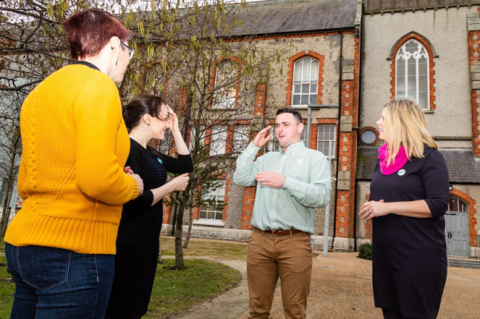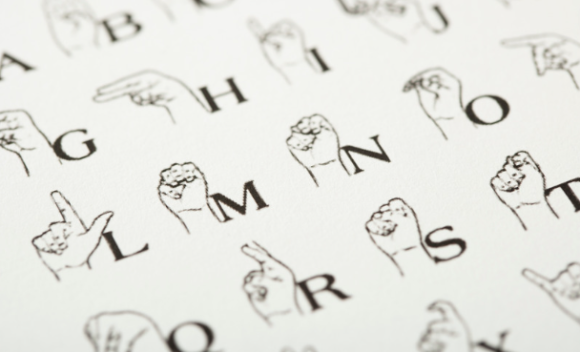Any language is a living system. Language is not about individual words or phrases; it is about how those words uniquely connect as part of the living system. And when it comes to science, context matters a lot, as scientific terms often combine knowledge from many areas of expertise.
Anna Wedderburn, project coordinator for ABE Ireland at University College Dublin, has seen the importance of context in language firsthand, as she has worked with experts at Dublin City University (DCU) and Deaf community representatives to add 20 biology terms to a STEM glossary in Irish Sign Language (ISL). “There is a big gap in ISL when it comes to STEM,” Wedderburn says, which she learned from working on the project. “This leads to biology and other STEM subjects being less accessible to the Deaf community across Ireland.”
Wedderburn and the ABE Ireland team started this project a year ago, reaching out to the team at DCU with the goal of being able to run ABE workshops with Deaf and hard-of-hearing teachers. The new terms were derived from ABE material and included words like “micropipetting” and “electrophoresis.” Adding 20 new terms to ISL may seem like a small task, but it is actually quite challenging when considering the importance of context in any language.
“The team’s job in this is to ensure that the new signs fit in with the rest of the language properly and also fit the lab context,” Wedderburn explains. “Fully understanding how a piece of equipment or a reagent works is really important.” For example, the ABE team helped explain what gel electrophoresis is by sharing pictures of what the tanks look like, what the resulting gels look like, and how DNA fragments get separated out. “This allowed the team to understand it visually and then come up with the right way of communicating it,” she says.
The team at DCU, led by Elizabeth Mathews (PhD), had already added 500 STEM terms to the glossary as part of this ongoing project, and these 20 more-specialized biology terms will help fill in some of the remaining gaps. The team says that the most exciting part of the process is always the research and development workshops, led by a team of Deaf teachers, ISL experts, and Deaf community representatives, with support from Deaf and hearing scientists and science communicators. “It has been great to have some of the team at ABE Ireland join us for those workshops, to share their expertise in molecular biology but also in how they engage educators with the discipline,” the DCU team said in a written statement.
The input of scientists, including the ABE team, is important, they said, because not everyone in the room has a science background. Molecular biology, in particular, can be challenging from a science communication perspective as it involves different disciplines such as biology, chemistry, and technology.

ISL is the first language for some 5,000 people in Ireland, yet there are only three schools that cater to Deaf and hard-of-hearing children in the country. Many Deaf students will go to mainstream schools, often without an interpreter. With these new additions to the glossary, the hope is to make biology and biotechnology more accessible and engaging for those communities–starting with a pilot of the new glossary for ABE teachers in the next school year. “The glossary is a living resource, so even after sharing the signs identified by our team, it will continue to evolve and be updated based on feedback from the wider Deaf community in Ireland,” the DCU team said.
The ISL biology glossary is just one way ABE Ireland is working to reach underserved communities, Wedderburn says, pointing to their new project CuriosiTY, which provides biotech experience for secondary school students in a “transition year”—the year between the junior cycle and senior cycle when students learn life skills in school and have dedicated weeks for work experience. “We are always working on new ways to make biotechnology and STEM more broadly accessible throughout Ireland,” Wedderburn says.
Check out the Irish Sign Language STEM glossary
